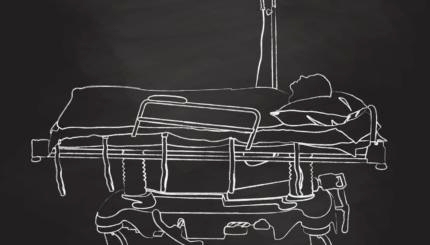Reprinted with permission from Wrestling with the Angel: Jewish Insights on Death and Mourning, Jack Riemer ed. (published by Schocken Books).
There is no more poignant time of the year than the moment of (the memorial service for the dead) on . Never are there more people in the synagogue, and rarely, if ever, is there a moment of such high emotion. Yet a measure of objectivity would suggest that Yizkor does not belong with Yom Kippur. Yom Kippur is a day of introspection and repentance, not a day of sadness. Wouldn’t the prayer make more sense on Tisha B’Av, when we commemorate the sad events of our history?
A Conversation With the Dead
This question reflects a common misunderstanding of the nature of Yizkor. I would term the experience of Yizkor a conversation with the dead. Now, the phrase “conversations with the dead” is redolent of dark rooms and mediums in mystical outfits. But superstition and television cliches aside, we should realize that we all are part of an ongoing dialogue with the dead.
Many of us who have lost loved ones continue our conversations with them even after they are dead. Frequently, particularly after the pain of separation has diminished somewhat, those who remain seek solace and guidance in conversation with those they have lost. Even if we do not do it ourselves, most of us know people who stop to talk to a deceased parent or spouse each day before going to sleep or when getting up in the morning. These conversations may consist of reports on the status of their lives, questions, or requests for advice. And far from being a symptom of sanity loss, this practice of “touching base” is quite comforting and salutary, if kept within reasonable limits.

Help us keep Jewish knowledge accessible to millions of people around the world.
Your donation to My Jewish Learning fuels endless journeys of Jewish discovery. With your help, My Jewish Learning can continue to provide nonstop opportunities for learning, connection and growth.
Some may find the prospect of such daily conversations ridiculous and certainly not their style, but virtually everyone does it at some point in his life. I do not know anyone who, when attending or preparing for an important event such as a or a wedding, does not picture a lost loved one present and imagine the reaction that he or she would have. This, too, is a form of conversation with the dead.
Even people who have never lost a close friend or relative engage in conversations with the dead. One case in point is the universal impact of a Bill Mauldin cartoon that appeared in many newspapers after John Kennedy was shot. A variation on the Lincoln Memorial, it showed Mr. Lincoln sitting bent over, his head in his hands, crying. The weeping statue conveyed not only the grief of the nation but the profound violation of the values that Kennedy had represented. The embodiment of these values in the statue of our first assassinated president made sense only because we, contemporary Americans, were in conversation with a dead hero from our past.
And as this last example illustrates, the dead answer our call not in words, but in ways that nevertheless make a difference in our lives. All of us have learned valuable lessons in morality and behavior from those to whom we were close and whom we have lost. In the best of circumstances, they were positive lessons. But even if they were negative, these lessons serve as guideposts for the way we conduct our lives and are thus also part of our continuous conversation with the dead.
Halakhah (Jewish law) is precisely such a process, experienced collectively by each generation. We consult our authoritative books, the most essential of them written by people no longer with us. Yet they serve as our teachers, sometimes even as friends and colleagues, and we converse with them as we attempt to understand the nuances of their words. It is a dialogue between individuals of very different eras, in which we apply our modern categories of thought and understanding to their impressive intellect and traditional wisdom. Only by engaging fully in this dialogue can we find the eternal truths that will guide our contemporary lives.
On an individual basis, too, those who were major influences in one’s life speak continuously from beyond the grave. For myself, I know that whenever I accomplish anything even remotely valuable, I sense the presence of my father and his smiling face. So, too, whenever I give a sermon or class that I think is even remotely worthy of my sainted teacher Rabbi Soloveitchik, zt”l [may his memory be a blessing], I can feel his approbation. And if I hit a clunker, I can almost hear his vaunted temper expressing itself.
The classic example of this kind of dialogue is the biblical story of Joseph’s captivity in Egypt. The midrash (homiletical story of rabbinic origin) tells us that Joseph, when approached for immoral purposes by Potiphar’s wife, was actually tempted. However, at that moment Joseph was visited by an image of his father, Jacob (who was not technically dead at that point, but, given Joseph’s situation, might as well have been), and no longer responded to the woman’s advances. The message of this story is that conversations with those absent from our life keep us honest and on track, sometimes in the face of enormous communal or societal pressure.
Many will recognize the experience of finding oneself in an ethical dilemma and not being sure what to do. Inside each of us there speaks a small voice, part of which is a father, a mother, or some other loved one. If we listen to that voice, we get a sense of how to deal with the situation. Thus our conversations with the dead not only guide us, but also reconcile us with the moral decisions we make in an effort to do right.
A Biblical Example
What happens, however, in those situations where we cannot get approbation for what we do? What happens if we find ourselves truly at odds with the dead in our communications? For the answer we must turn to one of the most tragic of all biblical stories, as told in I Samuel 28:5-6. It was the night before King Saul’s final battle, and Saul was afraid.
“And when Saul saw the camp of the Philistines, he was afraid, and his heart greatly trembled. And when Saul inquired of the Lord, the Lord answered him not, neither by dreams, nor by Urim [the priestly breastplate sometimes used for communication with God], nor by prophets.”
Abandoned by God, Saul took a forbidden step. He summoned a necromancer, a seeker of the dead–an anathema to and to Saul throughout his life–to raise the prophet Samuel from the dead and ask him what to do.
Saul and Samuel, toward the end of the latter’s life, had experienced a terrible falling-out over Saul’s noncompliance with God’s word, i.e., Saul’s failure to completely eradicate Amalek, the Jews’ worst enemy, as he had been commanded. This created a permanent rift between these two longtime friends and cost Saul his kingdom. Yet Saul, desperately seeking guidance, sought out his old friend beyond the grave.
Unfortunately for Saul, when Samuel rose from the ground he was in no mood for reconciliation. Saul pleaded (I Samuel 28:15), “I am in great distress, for the Philistines make war against me, and God has departed from me, and answers me no more, neither by prophets, nor by dreams.” But Samuel’s response offered neither help nor hope.
“Why then do you ask of me, seeing the Lord has departed from you, and has become your enemy? And the Lord has done for Himself, as He spoke by me; for the Lord has torn the kingdom from your hand, and given it to your neighbor, to David. Because you would not obey the voice of the Lord, nor execute His fierce anger upon Amalek, therefore has the Lord done this thing to you this day. And the Lord will also deliver Israel with you into the hand of the Philistines; and tomorrow shall you and your sons be with me; the Lord also shall deliver the camp of Israel into the hand of the Philistines (I Samuel 28:16-19).”
What a devastating statement! What a terrible conversation to have with a former friend! Yet despite the harsh words, there actually is some small measure of comfort in what Samuel says. His penultimate words are “Tomorrow shall you and your sons be with me.” Even when we are at odds with those in our past and when there is, sadly, no explicit verbal reconciliation, there is at least a sense that we will come to share a final reconciliation. After all, we do ultimately find ourselves in the same place.
A Never Ending Conversation
Yizkor is the ritual embodiment of our conversations with the dead. Our conversations with the dead provide us with guidance, help us determine where we have been right and where we have been wrong, and reconcile us with our past. There can certainly be no more fitting and appropriate day for these conversations than Yom Kippur, and the recitation of Yizkor probably originated here before also being instituted on the last days of [Passover], Sukkot, and Shavuot.
Sometimes our conversations with the dead are painful, sad, and tragic. At other times, they are nostalgic and even comforting. Ultimately and perhaps unexpectedly, they are a celebration of the human capacity to transcend the limits of this life.
The tells us that no eye has ever seen the world beyond and then been permitted to come back and report what that world contains. But it is also true that some voices carry across that great divide. With Yizkor and our other conversations with the dead, if we listen, our ears can hear what our eyes may not see.
Sign up for a Journey Through Grief & Mourning: Whether you have lost a loved one recently or just want to learn the basics of Jewish mourning rituals, this 8-part email series will guide you through everything you need to know and help you feel supported and comforted at a difficult time.
Looking for a way to say Mourner’s Kaddish in a minyan? My Jewish Learning’s daily online minyan gives mourners and others an opportunity to say Kaddish in community and learn from leading rabbis.
mitzvah
Pronounced: MITZ-vuh or meetz-VAH, Origin: Hebrew, commandment, also used to mean good deed.
Help us keep Jewish knowledge accessible to millions of people around the world.
Your donation to My Jewish Learning fuels endless journeys of Jewish discovery. With your help, My Jewish Learning can continue to provide nonstop opportunities for learning, connection and growth.


